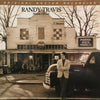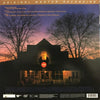









Randy Travis – Storms Of Life (Ultra Analog)
ORDER LIMITED TO ONE ITEM PER CUSTOMER
Randy Travis – lead vocals
Baillie & the Boys – background vocals
Thomas Brannon – background vocals
Paul Davis – background vocals
Phil Forrest – background vocals
Lisa Silver – background vocals
Diane Stegall – background vocals
Paul Overstreet – background vocals
Kyle Lehning – keyboards, background vocals
Eddie Bayers – drums
Kenny Bell – acoustic guitar
Dennis Burnside – keyboards
Larry Byrom – acoustic guitar, electric guitar
Mark Casstevens – acoustic guitar
Jerry Douglas – dobro
Steve Gibson – electric guitar
Doyle Grisham – steel guitar
Mark Hembree – acoustic bass
Hoot Hester – fiddle
David Hungate – bass guitar
Don Jackson – clarinet
Greg Jennings – electric guitar
Kirk "Jelly Roll" Johnson – harmonica, percussion
Shane Keister – keyboards
Larrie Londin – drums
Terry McMillan – harmonica, percussion
Fred Newell – electric guitar
Mark O'Connor – fiddle, mandolin
Michael Rhodes – bass guitar
Blaine Sprouse – fiddle
Keith Stegall – electric guitar
James Stroud – drums
Bobby Thompson – acoustic guitar
Jack Williams – bass guitar
Bobby Wood – keyboards
Paul Overstreet (A1), Don Schlitz (A1), Max D. Barnes (A2), Troy Seals (A2), Ronny Scaife (A3), Don Singleton (A3), Phil Thomas (A3), Al Gore (A4), Overstreet (A4), Nat Stuckey (A4), Overstreet (A5), Buddy Blackmon (B1), Vip Vipperman (B1), Randy Travis (B2), Joseph Allen (B3), Charlie Williams (B3), Travis (B4), Steve Clark (B5), Johnny MacRae (B5)
1LP, Gatefold jacket
Limited numbered edition
Original analog Master tape : YES
Gain 2™ Ultra Analog
Heavy Press : 180g
Record color : black
Speed : 33 RPM
Size : 12'’
Stereo
Studio
Record Press : RTI
Label : MOFI
Original Label : Warner Bros
Recorded in 1985 at Emerald Sound Studio (Nashville), GroundStar Lab (Nashville), Sound Stage Studio (Nashville), Morning Star Studio (Spring House)
Engineered by Ben Harris (A3, A4, B3), Eric Prestidge (A2, B1, B2), Joseph Bogan (A1, A5, B4, B5)
Mixed at Morningstar Studios
Produced by Kyle Lehning (A2-5, B1-3, B5), Keith Stegall (A1, B4)
Mastered by Krieg Wunderlich at Mobile Fidelity Sound Lab
Originally released in June 1986
Reissued in Sept 2022
Tracks:
Side A:
- On The Other Hand
- The Storms Of Life
- My Heart Cracked (But It Did Not Break)
- Diggin' Up Bones
- No Place Like Home
Side B:
- 1982
- Send My Body
- Messin' With My Mind
- Reasons I Cheat
- There'll Always Be A Honky Tonk Somewhere
Reviews :
“His first and best album features astonishing Lefty Frizzell-style pipes, excellent material, and sympathetic production. Easily the most impressive country debut of the '80s, it includes "1982," "On the Other Hand," "Diggin' Up Bones," and "No Place Like Home."” AllMusic Review by Mark A. Humphrey
“Country music enjoyed one of its cyclical popularity booms in the early 1980s, in large part thanks to the success of the film Urban Cowboy. At that time, most artists had crossover ambitions and the music became more and more pop-oriented, but there was a quiet backlash brewing. It started roughly around 1981 with the major label debuts of Ricky Skaggs and George Strait and it continued through 1984 with the release of Reba McEntire’s landmark My Kind of Country album, and The Judds’ commercial breakthrough hit “Mama He’s Crazy”. Still, these artists were very much the exception rather than the rule. By mid-decade, the Urban Cowboy craze was over, and country music was once again in the commercial doldrums. No one took much notice when an unknown singer named Randy Traywick was signed to a singles deal with Warner Bros in 1985, but within a year Traywick, rechristened Randy Travis by the label, would be the hottest commodity in country music.
Randy’s first release was the Don Schlitz and Paul Overstreet composition “On The Other Hand”, a hardcore traditional ballad, which along with Randy’s nasal baritone, had no crossover appeal whatsoever and was not what radio wanted. Consequently, it died at #67 on the charts. Randy and producer Kyle Lehning were unrepentant. Fortunately, Warner Bros. allowed them to try again with the equally traditional “1982”. Written by Buddy Blackmon and Vip Vipperman, the song’s original title was “1962”, but the writers granted Randy permission to change the lyrics to something more age-appropriate. To everyone’s surprise, radio took notice this time and “1982” managed to climb all the way to #6. Encouraged by this success, Warner Bros. made the unusual decision to re-release “On The Other Hand” in April 1986. And the rest, as they say, is history. Now that Randy had a legitimate hit under his belt, radio programmers were now willing to give “On The Other Hand” a listen, and it quickly shot to #1.
Suddenly, everyone was talking about Randy Travis, who quickly returned to the studio to record an album to capitalize on the success of “On The Other Hand.” When the album was near completion, he and Kyle Lehning expressed their hope that they could sell 50,000 to 60,000 copies so the label would allow them to record a second album. Clearly they didn’t realize that they were about to alter the course of country music for the next several years. Storms of Life was single-handedly responsible for country music’s return to its roots after decades of what seemed to be an inevitable drift towards pop. As a result, what would soon be known as the New Traditionalist movement was now firmly underway as other artists, old and new, including some of Nashville’s most pop-leaning acts, followed Randy’s example and began releasing more traditional-sounding music. Those who did not were unceremoniously purged from the radio airwaves.
The album reached store shelves in June 1986, nearly one year to the day after the initial release of “On The Other Hand.” It was produced by Kyle Lehning, with Keith Stegall co-producing on two tracks. It contained both “On The Other Hand” and “1982”, along with Randy’s own composition “Reasons I Cheat”, which had been the B-side to “1982”, as well as seven newly-recorded songs. The uptempo “Diggin’ Up Bones”, written by Paul Overstreet, Nat Stuckey and Al Gore (not the former US Vice President), was the next to be sent to radio and like its predecessor, it quickly rose to #1. By now Randy was now being interviewed by the mainstream press, who openly pondered the last time they’d heard the word “exhuming” used in a song. Yet another Paul Overstreet composition, “No Place Like Home” was selected for the album’s fourth and final single. This song is somewhat forgotten today, but it is one of Randy’s best ballad performances. It peaked at #2 in the spring of 1987.
Storms of Life is one of those rare albums that contains no filler, which is great from a fan’s point of view but it makes a critic’s job much more difficult because it isn’t possible to talk about an album’s flaws when there simply aren’t any. All ten tracks are strong enough to have been successful singles. It’s difficult to choose favorites, but if pressed I’d have to go with “My Heart Cracked (But It Did Not Break)” and “Messin’ With My Mind”, both of which show the extent to which Lefty Frizzell influenced Randy’s music, as well as “Send My Body” and “Reasons I Cheat”, both of which allowed Randy to showcase his songwriting skills. “Send My Body” is a surprisingly upbeat sounding song about a condemned man, who despite his innocence, is determined to meet his fate with poise and grace, requesting that his body be returned to his hometown for burial. “Reasons I Cheat” is another beautifully performed ballad. As its title implies, it’s a cheating song, but one in which the protagonist expresses few feelings of guilt, but rather seeks to rationalize his actions and does so quite effectively, because, surprisingly, he comes across as a sympathetic figure.
It’s a gross understatement to call Storms of Life a landmark album, as its importance can not be overstated. I consider it to be one of the finest country albums of all time, and the most significant one released during my own lifetime. Far exceeding Travis’ and Lehning’s modest sales ambitions, it ultimately earned triple platinum certification at a time when even gold-level sales for country albums were rare. As a result, it caused a shake-up of the entire country genre, the likes of which had never seen before, and will probably never been seen again. Sadly, within a few years of its release, country music lapsed back towards pop, a trend that continues to the current day.
It is nothing short of a disgrace that Warner Bros. has allowed the 25th anniversary of Storms of Life’s release to pass without a remastered and expanded re-release; however the album is still in print in its original form and easy to find.” My Kind of Country
Ultra Analog™ : The GAIN 2 Ultra Analog™ Series stems from the use of the Gain 2 system, mastered at half speed from the original master tapes where possible, capturing and uncovering as before undiscovered sonic information.
Half-speed mastering. In half-speed mastering, the whole process is slowed down to half of the original speed. A typical 33 1/3 rpm record is cut at 16 2/3 rpm. The source material is also slowed down (reducing the pitch in the process) meaning the final record will still sound normal when played back. Slowing the whole process down allows more time, which means the end result sounds better and is more efficient — allowing engineering to minimize the effects of inherent limitations within the vinyl format. The result is a more accurate and more open high-frequency response in the half speed vinyl when compared with a normal speed recording.
Ratings :
Discogs : 4.8 / 5 ; AllMusic : 5 / 5




